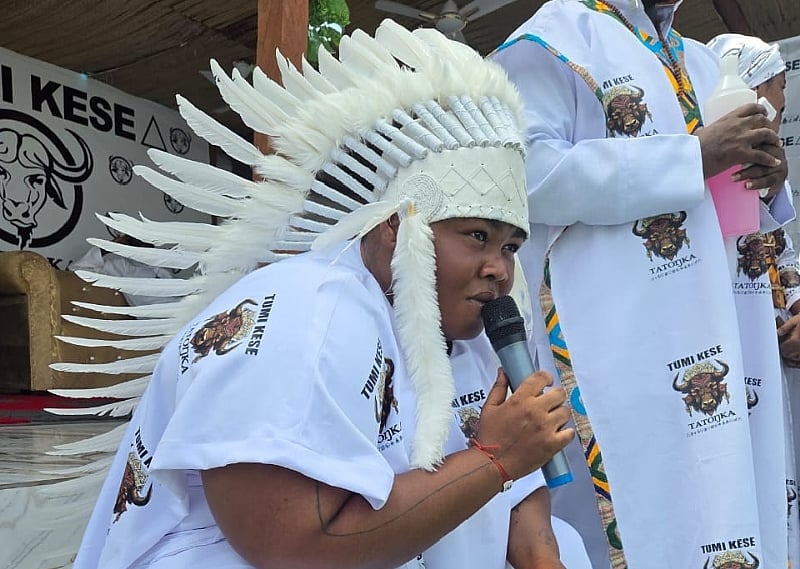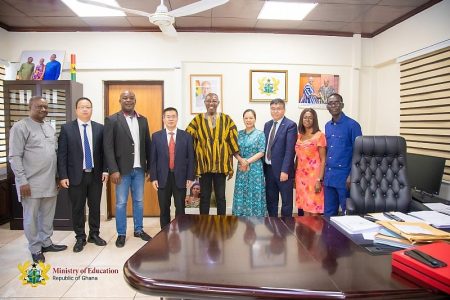The Ola Herbal and Spiritual Centre (Soul Travel Ghana) recently held its inaugural initiation ceremony, marking a significant step towards establishing a stronger Shamanic presence in Ghana. The event, held at Kasoa-Opeikuma, celebrated the culmination of five years of rigorous training for five individuals, one of whom was ordained as a Shaman and the other four as Spiritual Healers. The ceremony, themed “Honouring The Ancestral Lineage And The Reawakening of Ancestral Gifts Through The Ordination,” emphasized the importance of传承 and the passing down of spiritual knowledge and abilities through generations. The event attracted a diverse audience, including well-wishers, members of Soul Travel Ghana, and community members, signifying a growing acceptance and interest in spiritual practices.
Ola Maame, the founder and leader of Soul Travel Ghana, presided over the ceremony. She highlighted the significance of mentorship and spiritual support for newly ordained practitioners. She explained a key ritual involving the consumption of kola nuts and salt, emphasizing its role in creating a pact among the practitioners to ensure mutual support and discourage betrayal. This symbolic act underscores the importance of unity and collaboration within the spiritual community. Ola Maame also expressed gratitude for the support received from religious and traditional leaders, indicating a growing recognition of the work of spiritualists within the broader Ghanaian society.
A unique aspect of the ceremony was the gifting of ¢500.00 to twenty attendees. Ola Maame explained this act of charity as an investment in the recipients’ businesses, empowering them to achieve sustained growth and prosperity. This gesture reflects the holistic approach of Soul Travel Ghana, extending its influence beyond spiritual guidance to encompass economic empowerment. Ola Maame further announced upcoming events, including the “Tumi Kese” festival and a retreat organized by Orobas, the son of the night, which will focus on fertility, money, and travelling rituals. This diverse range of offerings demonstrates the center’s commitment to addressing a wide spectrum of human needs and desires.
Nana Kwadwo Obiri, General Secretary of the Ghana Federation of Traditional Medicine Practitioners Associations (GHAFTRAM), commended Ola Maame’s guidance to the graduates, emphasizing the importance of ethical practice and the individual choice between good and evil. He encouraged the newly ordained practitioners to register with GHAFTRAM, highlighting the legal protection and professional recognition this affiliation provides. This advice underscores the importance of operating within established frameworks and adhering to professional standards within the field of traditional medicine and spiritual practice.
Of the five graduates, three are continuing their pastoral work elsewhere, while two will remain with Soul Travel Ghana, ensuring the continuity of the center’s spiritual work. This blend of expanding reach and maintaining a core team demonstrates a strategic approach to growth and sustainability. The five graduates – Happy Nukafu, Rose Amegadzi, Blessing Amu, Emmanuel Fobih, and Samson Annor-Addo – represent a new generation of spiritual practitioners in Ghana, trained and empowered to carry forward the traditions and teachings of Soul Travel Ghana.
While this inaugural ceremony signifies a notable stride towards establishing a more prominent Shamanic presence in Ghana, the long-term impact remains to be seen. The success of this endeavor will depend on various factors, including the continued growth and development of Soul Travel Ghana, the acceptance and integration of Shamanic practices within Ghanaian society, and the ability of the newly ordained practitioners to effectively utilize their skills and knowledge to serve their communities. The ceremony marks not only a beginning but also a point of observation, requiring further analysis and assessment to determine the true extent of Shamanism’s entrenchment in Ghana. Only with the passage of time and the unfolding of subsequent events will a clearer picture emerge. The ceremony plants a seed, but future growth and fruition will ultimately determine the true impact on the spiritual landscape of Ghana.
The event’s theme, “Honouring The Ancestral Lineage And The Reawakening of Ancestral Gifts Through The Ordination,” underscores the importance of lineage and the passing down of spiritual knowledge. The graduates are not simply acquiring new skills, but also connecting with a rich history and tradition. This emphasis on ancestral connection provides a strong foundation for their future work and strengthens the sense of community within the spiritual practice. Furthermore, the ceremony’s location in Kasoa-Opeikuma, a town steeped in traditional beliefs and practices, adds another layer of significance to the event. This choice of location further reinforces the connection to ancestral roots and the integration of Shamanic practices within the existing cultural fabric of Ghana.
Ola Maame’s explanation of the kola nut and salt ritual highlights the importance of trust and mutual support within the spiritual community. This ritual acts as a symbolic bond, ensuring that the practitioners work together for the collective good and avoid actions that could harm one another. It serves as a reminder of the interconnectedness of their work and the responsibility they hold towards each other and the community they serve. The ritual also emphasizes the importance of intention and the power of symbolic actions in spiritual practice.
The gifting of money to attendees reflects a broader philosophy of empowerment and community support. By investing in the economic well-being of others, Ola Maame and Soul Travel Ghana demonstrate a commitment to holistic development. This act of generosity goes beyond the purely spiritual realm and addresses the practical needs of individuals within the community. It also highlights the potential for spiritual practices to contribute to positive social and economic change.
The advice from Nana Kwadwo Obiri underscores the importance of operating within legal and ethical frameworks. By encouraging registration with GHAFTRAM, he emphasizes the need for professional recognition and adherence to established standards. This ensures that traditional medicine and spiritual practitioners operate with integrity and accountability, fostering trust and credibility within the wider community. It also protects practitioners from potential legal challenges and promotes a more organized and regulated approach to spiritual practice.
The future of Shamanism in Ghana will depend on the continued dedication and efforts of practitioners like Ola Maame and her graduates. Their ability to adapt to the changing social landscape, integrate traditional practices with contemporary needs, and maintain ethical standards will be crucial for the long-term success and acceptance of Shamanism. The inaugural ceremony marks a significant milestone, but it is only the beginning of a journey that will require ongoing commitment, innovation, and collaboration.














